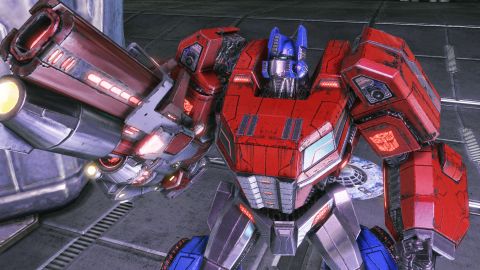GamesRadar+ Verdict
Pros
- +
XP and challenge-based rewards are a fun way to progress
- +
Escalation mode is still hugely enjoyable
- +
Smashing Decepticons as Grimlock is fun
Cons
- -
Flat pacing
- -
Frustratingly uneven difficulty
- -
Very little gameplay variation
Why you can trust GamesRadar+
It was really only a matter of time before Activision mashed its dueling Transformers universes together. War for Cybertron and its sequel, Fall of Cybertron, are relative critical successes on their own merits, while the movie tie-in games have the instant cachet of being linked with summer blockbusters. It's easy to imagine that combining them would bring out the best in both franchises, or at the very least strike marketing gold. Instead, Transformers: Rise of the Dark Spark is a limp, plodding shooter that does little to elevate the movie universe, and drags the Cybertron series down in the process.
Establishing the Cybertron games as prequels to the movies, Dark Spark splits its 14 chapters between the film continuity--which sees Autobots Optimus Prime, Bumblebee, and Drift trying to wrest the titular macguffin away from new villain Lockdown--and the Cybertron timeline, where the perspective switches between Autobots and Decepticons as they battle over the Dark Spark in what amounts to an extended flashback. It's a potentially interesting approach, but the two pieces don't ever really feel like they connect. In fact, the modern levels are so ugly and generic that they feel like afterthoughts meant to prop up a shorter-than-normal Cybertron campaign.
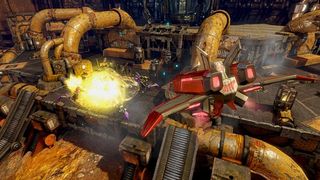
Playing--in general terms--like Fall of Cybertron, Dark Spark devotes each chapter to a different character (or group of characters) with a special ability, some more useful than others. Sideswipe, for example, can climb around quickly with a versatile grappling hook, while Drift can instantly slash any enemies in view to pieces. Optimus has a shield, Soundwave can distract enemies with his avian sidekick Laserbeak, Sharpshot turns invisible, and so on. Apart from their abilities, however, everyone feels more or less the same; each robot transforms into either a gun-covered wheeled vehicle or a flying one (both with confusing controls), and everyone can carry two huge, impressively destructive firearms at a time, from an upgradable, unlockable stash of 20.
The similarities with Fall of Cybertron don't end with basic gameplay; in fact, Dark Spark feels like nothing so much as an uninspired expansion, as if scenes were scraped together from FoC's cutting-room floor and cobbled into a new game using the same assets. No matter what the setting, the action boils down to little more than tromping around and shooting the same largely indistinguishable robots--or worse, robot bugs--over and over again. And that might not be so bad, except that the story and pacing are so resolutely tepid that there's no real sense of purpose or urgency to pull you through firefight after repetitive firefight.
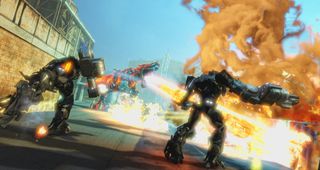
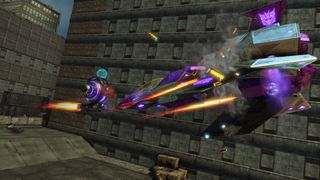
Want to earn more XP in a hurry? Rise of the Dark Spark's optional "hacks" can give you fat bonuses, but they come at a steep price. If you're confident in your aim, for example, you can turn off your HUD, including your targetting reticle and any button prompts. You can also toughen up your enemies, make it so your shield only recharges with kills, or make enemies explode when killed. These are great for challenge-seekers and dedicated players, but those simply aiming to slog through once may want to pass.
Worse, the difficulty spikes suddenly and unexpectedly throughout the campaign. One second, you might be effortlessly mowing down waves of Decepticon thugs; the next, they'll suddenly swarm and reduce you to scrap in two hits. Dark Spark especially likes to spring these moments on you during long, hold-the-fort-against-waves-of-enemies sequences that you'll inevitably have to start over. And then start over again.
High Moon Studios, the series' usual developer, didn't work on Dark Spark, and it shows. The game exhibits signs of sloppiness, ranging from last-gen-looking graphics and sound that gets muffled when characters talk, to nagging crashes while upgrading weapons. More importantly, however, it feels soulless next to High Moon's work.
Fall of Cybertron knows how to pace its levels, smartly building tension and releasing it in breakneck, thrill-ride moments. Dark Spark settles for nonchalantly dumping you into half-baked obstacle courses and enemy-filled arenas, and then tacks on optional challenge objectives or arbitrary timers by way of variety. Fall continually gives you reasons to transform and move quickly; Dark Spark will occasionally remember to design a level around flight. And where Fall has funny banter and memorable characters, Dark Spark manages the impressive feat of making a giant, transforming robot samurai insufferably dull by giving him nothing but whiny lines about honor.
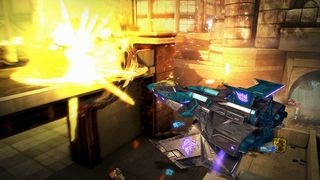
As deeply flawed as it is, though, Dark Spark isn't an unremittingly terrible game. Building on the same basic mechanics that made its predecessors fun, it manages to be a bland but serviceable shooter, and it can be enjoyable when it isn't being randomly unfair. It even has a few standout moments, like getting to stomp around as robot T-Rex Grimlock or Decepticon giant Bruticus, although those don't happen very often.
More interestingly, Dark Spark also introduces a new upgrade system. Rather than letting you beef up your weaponry and consumable power-ups with currency, Dark Spark hands out reward packages based on experience points and challenges. Did you just hit level 12? You get a prize box! Did you kill 250 Decepticons, destroy six hidden billboards, or complete any of the other optional challenges the game throws your way? Prize boxes all around!
Each one is like a pack of cards, doling out a randomized assortment of multiplayer characters, weapon upgrades, and consumables. This doesn't always work in your favor--you might fully upgrade guns you never use, while your favorites never improve--and opening boxes gets laborious after a while, especially if they're full of items you've already unlocked. Still, it's a fun idea that creates a regular sense of reward, and in a game this drab, that counts for something.
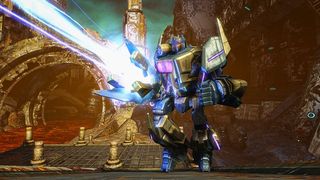
Aside from its campaign, Rise of the Dark Spark also brings back its predecessors' Escalation mode (sadly not present in the Wii U version), which lets four players fight off waves of enemies while (ideally) protecting each other and upgrading their base with automated defenses. This is easily one of Dark Spark's most enjoyable aspects, especially if you've got a competent team together, although it's the only online mode you'll find here; the competitive multiplayer and co-op modes from previous Cybertron games are conspicuously absent.
In trying to be both a movie tie-in and an interquel to a fan-favorite series, Transformers: Rise of the Dark Spark creates two different sets of expectations. Looking at it as a summer-movie game, it feels like a well-intentioned experiment gone awry. And really, given how movie-games so often turn out, it could have been a lot worse As a Cybertron entry however, lackluster design and unremarkable action make Dark Spark a sad disappointment. I can only hope it's meant as a spin-off, and not an indicator of the series' future.
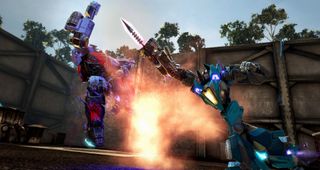
While far from the worst Transformers game, Rise of the Dark Spark's interesting ideas are eclipsed by bland action and frustrating design.
Reviewed on PS4
More info
| Genre | Action |
| Description | Autobots or Decepticons, choose your side and secure the Dark Spark. |
| Platform | "Xbox One","PS4","Wii U","Xbox 360","PS3","PC","3DS" |
| US censor rating | "Teen","Teen","Teen","Teen","Teen","Teen","Teen" |
| UK censor rating | "","","","","","","" |
| Release date | 1 January 1970 (US), 1 January 1970 (UK) |

Helldivers 2 dev asks players to stop deliberately shooting at soldiers with that sweet blue pre-order bonus armor that's apparently a yogurt salesman uniform

Stellar Blade release time – the countdown to the new PS5 action RPG is on

Wilson Fisk celebrates 60 years of Daredevil by reclaiming his mantle as the Kingpin
